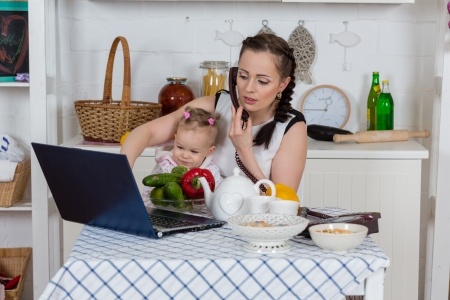
Chances are, if you are asking this question, you probably don’t qualify to take the “Home Office Deduction.”
Income Tax Deduction: Business Use of Your Home
The deduction for the business use of your home, commonly referred to as the “Home Office Deduction,” has long been thought to be one of the biggest triggers for an audit from the IRS. Much debate and many statistician hours have been devoted to determining whether this is in fact on the IRS’ “list” of triggers; however, since the IRS does not make its business of letting us in on such coveted information, we can only speculate. Erring on the side of caution and assuming that the Home Office Deduction is on the top of that “list,” if you are flirting with the idea of attempting to claim this deduction you need to ask yourself a few questions.
Used in Connection with Trade or Business
In order to pass the threshold to claiming the deduction for the business use of your home, part of your home must in fact be used in connection with a trade or business. If you are thinking to yourself, “Bring work home? Here, where I come to get away from work?” then you should count yourself out for this deduction.
Usually the deduction is strongly connected with small business owners and those who work for small business owners. The idea behind this deduction is to give small business owners a break by allowing them a deduction for the area of their home they use to “work from home.” Whereas traditional brick-and-mortar businesses would deduct their lease or payment to the bank for their storefront or office space, those who instead work from a space in their own homes have the opportunity to take a deduction for the part of their homes given over to their business ventures.
If you, like most small business owners, cannot remember the last time you went home without work, then read on to determine if you might be able to take this deduction.
Principal Place of Business
Your home must be the principal place of business to take the deduction for that business. Although you can have more than one business location (including your home), your home must be the principal place of business for that business. In other words, in order to claim the deduction for the spare room, you must do something in the spare room connected to your business that you don’t do anywhere else – or in this instance at any other location in which you conduct business.
For example, you use the spare bedroom and bathroom for your handmade soap business. That room and bathroom are where you mix and blend and form your handmade soaps, that you then take to your storefront downtown to sell. You do not make any soap at the storefront. You only display and sell the soap there and you use the desk in the back to keep your books when not assisting customers. No one is allowed in the extra bedroom at your house because there is nothing in there but your beautifully aromatic soap clutter, and what a mess it would be if someone accidentally let Fluffy in!
Still nodding your head up and down? Keep going.
Exclusive and Regular Use
An illustrative example of someone who does not pass this test is the lady in the picture here working from her kitchen table. Although she might unfortunately have to work like this on a regular basis, this area of her home is not exclusively used for business. A computer or calculator or filing cabinet or desk or … any other office equipment or supply does not magically turn a room in your home into a “Home Office” just because it is kept or used in your bedroom or kitchen or dining room or … any other room in your home. If that room has any other purpose – if you do anything else in that room other than conduct your business – then that room is not exclusive for purposes of taking the deduction.
One exception to the exclusive requirement, used in our handmade soap business example, is space used to store inventory. You have been on a roll and made so much soap in anticipation of opening up an online store that your husband’s closet is no longer your husband’s closet. You might be able to include this space in your deduction calculation. After telling your husband this, he will agree that he never really needed a closet anyway…
But… if you only take over that closet when you are getting ready for an out-of-town market – which is quite rare now that you have the online store – then you can’t count that closet after all because your use is not regular. Regular use means more than “on occasion.”
How to take the Home Office Deduction
For a full explanation of the “Home Office Deduction,” you should refer to IRS Publication 587 Business Use of Your Home. There you will find:
- Requirements: A full explanation of all the requirements you must meet in order to qualify to deduct business expenses for your home.
- Types: A comprehensive list of the types of expenses you are allowed to deduct for the business use of your home.
- Calculation: How to figure out exactly how much your deduction should be.
- Special Rules: Applicable to daycare providers, those storing inventory or product samples, and factoring depreciation on your home.
- Records: How to keep the records to substantiate this deduction.
- Form 8829: Where most taxpayers deduct these expenses.
Still confused?
The Priest Firm can guide you through the steps you need to take to make the determination, to prepare to take the deduction in the future, or even defend you against the IRS’ disallowing the deduction in a prior year. Contact us today to schedule a consultation with Ms. Priest.


